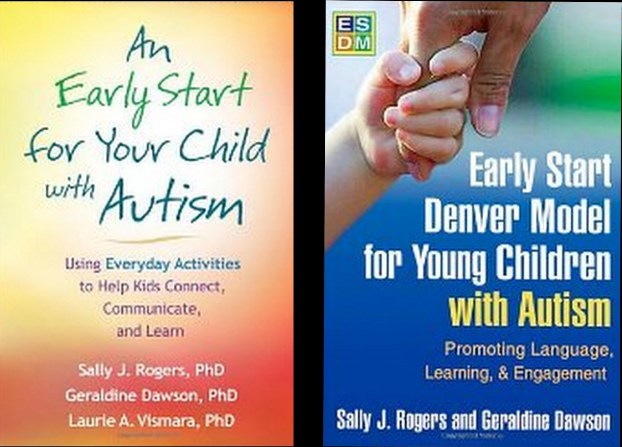
The Early Start Denver Model (ESDM)
ESDM is an evidence-based, naturalistic developmental behavioral intervention that is specifically designed for very young children with autism or those are risk for autism who are ages 12 to 60 months. ESDM provides a structured intervention that is play-based that fuses behavioral, relationship-based, and developmental principles into an integrated approach. It is flexible in format and in its intensity. It can be provided by trained clinicians from a variety of backgrounds. Our ESDM services are provided by and supervised by licensed psychologists and board certified behavior analysts. These supervising clinicians also oversee services provided by behavior technicians. SSPS offers both low intensity (1 to 2 sessions per week of intervention) and higher intensity (multiple sessions of up to 20 hours total per week of intervention). ESDM services can be implemented in a variety of natural settings such as home, daycare, center or school. It is embedded within play and daily routines.
What Makes ESDM Special?
ESDM is a specialized approach which uses developmental psychology to ensure that the child’s individual developmental stages shape the treatment goals and intervention strategies. There is careful balance between play partners, with each person leading and following within play activities. ESDM intervention objectives are individualized for each child based on the results of the ESDM Curriculum checklist, which covers all developmental domains (e.g., expressive communication, receptive communication, play skills, social skills, imitation, fine and gross motor skills). The checklist is completed every 12 weeks to allow for consistent evaluation of progress. The program is then revised to provide for maximal growth.
ESDM intervention uses teaching strategies of applied behavior analysis emphasizing the ABC’s of learning and proper use of prompting, fading, and chaining to teach concepts. ESDM also emphasizes relationship development between child and play partner, while imbedding the child’s interests into the activities, to ensure a high degree of motivation. ESDM intervention is fun and emphasizes positive affect. Attention is provided to arousal patterns and need for movement to maximize the child’s ability to attend during learning tasks. Data is collected each session to monitor progress, and this data is graphed and utilized to make adjustments in programing.
Read an interview with Dr. Sally Rogers about the importance of early intervention in children with autism.
ESDM Services
ESDM Direct Therapy
ESDM Direct Therapy builds a positive relationship between therapist and child
Uses play to encourage social engagement and communication
Children learn to have “talking bodies” which mirrors the way communication skills unfold during typical development of communication.
Teaching occurs during naturalistic play opportunities, within everyday activities and routines
Frequent access to intrinsic reinforcement is provided by providing child choice, materials of high interest, and following a child’s lead
ESDM direct therapy uses traditional toys and materials, with flexible teaching. It emphasizes variation so that skills are rapidly generalized across materials, people and settings.
P-ESDM: Parent/Caregiver Coaching
Caregiver coaching provides a great place to begin intervention for young learners
Caregivers practice key ESDM techniques to maximize child attention, motivation, communication and engagement during play and familiar activities of daily living
P-ESDM can be used for the youngest of children who are show signs of ASD or who are at risk for ASD during their first year of life.
10 to 14 weekly or bi-weekly sessions are scheduled to provide an introduction to the use of ESDM
In each session, caregivers gain knowledge about their child's growth and development while gaining practice with applying ESDM teaching techniques during play
Additional learning opportunities are provided through online lessons and practical exercises involving the child and clinician
P-ESDM is a great pre-cursor to ESDM Direct Therapy
ESDM Direct Therapy
Who Provides ESDM Direct Therapy?
ESDM is delivered within a flexible approach. Depending on the intensity of the program, direct services may be provided by a licensed psychologist, board certified behavior analyst or Registered Behavior Technicians (RBT)
Intervention is provided through direct 1:1 teaching and guided by ESDM Curriculum and ESDM teaching techniques
In higher intensity intervention (more than a few hours per week), services are also provided by Registered Behavior Technicians (RBTS) or Behavior Technicians (BT’s) who are trained to implement and teach communication strategies, social engagement, and daily living skills based on the child’s individualized treatment plan
Registered Behavior Technicians are supervised by a Board Certified Behavior Analyst (BCBA)
Behavior Technicians may be supervised by a Licensed Clinical Psychologist
Where Do Sessions Occur?
ESDM Direct Therapy most often occur in the child’s home.
Sessions may also be held at our office location or in community settings, such as daycare.
Our intake team will work with families to accommodate scheduling needs
Can I Participate in Sessions?
It is best practice to include caregivers in intervention for young children. This is why we often start with Parent Coaching ESDM prior to ESDM Direct Therapy.
During ESDM Direct Therapy, we continue to provide frequent opportunities for caregiver observation and collaboration. We want skills to rapidly generalize across people and materials.
Our clinicians will actively collaborate and work directly with caregivers to maximize each child’s success
We value caregiver involvement and encourage caregivers to participate throughout each session




